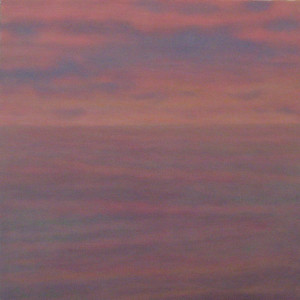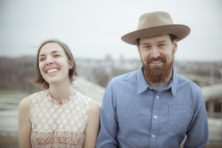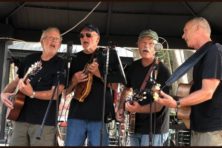The Wabi-Sabi of Woodwalk Gallery
- Share
- Tweet
- Pin
- Share

The leisurely spread of buildings at Woodwalk Gallery – a large barn, a few silos, an old farmhouse – are not unlike most of the structures on the Door Peninsula: hardy, practical, and stolidly European. So Woodwalk co-owner Allin Walker readily admits the incongruity of adopting the Japanese aesthetic of wabi-sabi as the guiding principle of the gallery.
It is “slightly absurd,” Walker says. “I mean, there’s nothing Japanese about the place.” And yet wabi-sabi has “become for us a philosophical grounding…It’s the beauty of things that have been used and loved and taken on a beauty of their own.”
Wabi-sabi is an aesthetic that finds beauty in the humble, the rustic, the impermanent, and the imperfect. Allin Walker and Margaret Lockwood (Walker’s wife and co-owner of Woodwalk) first learned about the concept in a book they received from a friend and have come to find it a fitting framework for the beauty they find in their livestock-barn-turned-art-gallery, located south of Egg Harbor on County Road G.
“There’s a wonderful imperfectness of wabi-sabi,” Walker explains. “And so I spent a fair amount of time for a while just reading about it…My favorite example is a hammer we have with a hickory handle, and you can see the imprint of the oil from the farmer’s hand on it. It’s really a gorgeous thing.”
Walker and Lockwood go on to cite other wabi-sabi elements of Woodwalk: the rusting tractor gears that are embedded in the concrete floor of the barn, a barn wall full of items they’ve unearthed from the property, and a chandelier made of recycled farm equipment that hangs in the building’s entryway.
Though they learned about the concept only after they completed the years-long process of renovating their barn into a thriving painting studio, art gallery, theater, and music space, the flexibility and enthusiasm for imperfection that defines wabi-sabi has characterized Lockwood and Walker since they first founded Woodwalk Gallery in 1994.
Woodwalk (the name is a combination of “Lockwood” and “Walker”) originally began in an old schoolhouse in Juddville. The gallery has always featured work by a range of artists, including Lockwood’s distinctive, abstract oil paintings, many of which explore spacious, light-infused landscapes. Woodwalk’s current roster boasts 43 artists whose media include clay, wood, metal, and all manner of paints. The artists, most of whom live in Wisconsin, are hand-picked by Lockwood.
Lockwood (who manages the artistic side of the gallery in addition to producing her own work) and Walker (who serves as Woodwalk’s general manager) bought the property on County Road G in 2005. Initially, Lockwood planned to maintain her painting studio at their previous gallery in Juddville. But Lockwood quickly tired of commuting to her studio.
She remembers, “I said something like, ‘Oh, I wish I had a studio here.’ The next thing I know, Allin…bought two hours of architectural service at a Unitarian auction. What he had [the architect] do was design what a studio would look like in the barn.”
The barn, originally built in the 1890s, had fallen into disrepair. So Lockwood and Walker asked straw bale builder Erik Frost and a few of his associates to lead the construction of a straw bale studio in the barn’s hay mow. Construction on the studio was completed in March 2006, and by July of that year Walker and Lockwood had decided to create a gallery in the barn as well.
“My heart was here in my studio and yet all my artwork was there in Juddville,” Lockwood says. “I wanted to be here.”
So Lockwood and Walker hired a crew, including Frost, Dave Gissel, Rich Higdon, Mark Moede, and Matt Stender, to embark on a full renovation of the barn, a project whose trajectory shifted frequently to accommodate Lockwood and Walker’s ever-expanding vision. The new gallery location opened for business in May 2007.
“It was a brainstorming session every morning,” recalls Mark Moede, “meetings with Allin and Margaret to figure out what the project was this week or today, and the goals would change…It certainly was one of the best jobs I’ve ever been involved in, because of Allin and Margaret and their openness to the ideas.”
“More than half of what’s going on there now was never part of the plan,” says Matt Stender, referencing the many ventures Woodwalk Gallery has added to its operation over the years: weddings, events for local non-profits, a weekly summer music series, regular theatrical productions, a papermaking studio, a sculpture garden and a labyrinth. “These opportunities arose and it worked and [Allin and Margaret] ran with it.”
To Walker, the renovation team’s collaborative approach to the barn project is a prime example of the wabi-sabi aesthetic.
“We had the luxury of saying to them, put love into the place,” Walker says. “Wabi-sabi.” Walker points to an ornamental bird’s-eye figure carved in the wood of Lockwood’s studio. “Wonderful little things like that. Them pouring love in.” The work crew’s names are even signed in the barn’s concrete floor.
The lasting mark the renovation crew left on the building is just the most recent layer of the barn’s long history. Musician Jeanne Kuhns, who runs a weekly concert series at Woodwalk, believes that history makes the barn an ideal venue for the performing arts.
“The barn is beautiful,” she says. “You can feel the music of the cows and the horses and the people soaked into the wood. It has good memories and good history. It’s not just a barn.”
In turn, says Mark Moede, the vibrant array of weddings, plays, and concerts that now take place at Woodwalk are leaving an impression on the gallery and on Lockwood’s studio.
“The married couples, before they get married, go up [to the studio] and talk. That studio is the green room for the concerts that happen there. So it’s got all that vibe and energy and spirit. So much creative stuff happens. That doesn’t just go away. Some of it stays in there.”
For Lockwood and Walker, that exchange of energy is characteristic of the wabi-sabi beauty they’ve come to value.
“When people come now for weddings and things like that here,” says Walker, “not only do they add something by being here. (If the walls could talk!) But really it pleases us that they seem to take something away from here as well.”
information
Woodwalk Gallery
Address: 6746 County Road G, Egg Harbor
Phone: (920) 868-2912
Website: www.woodwalkgallery.com








